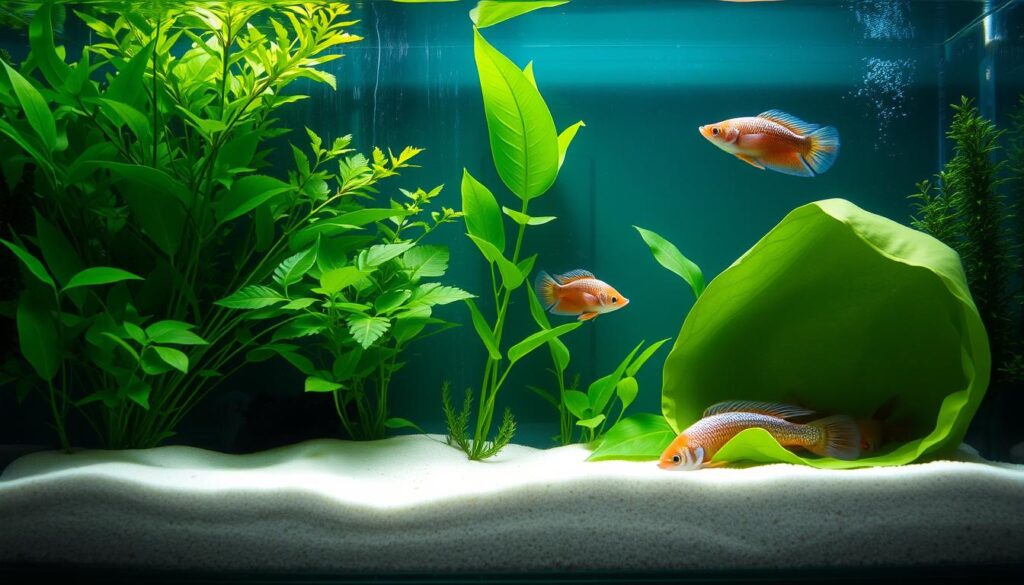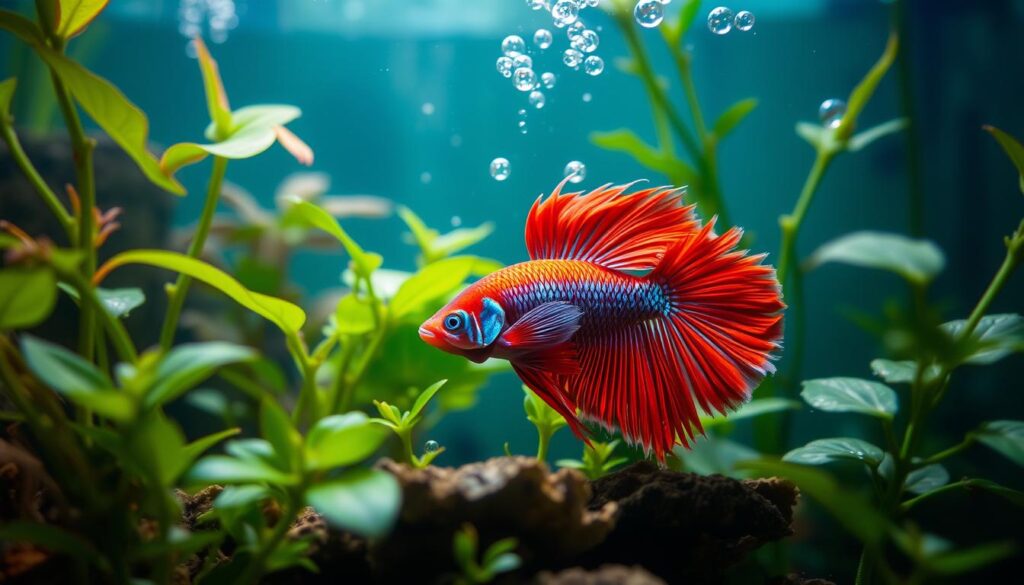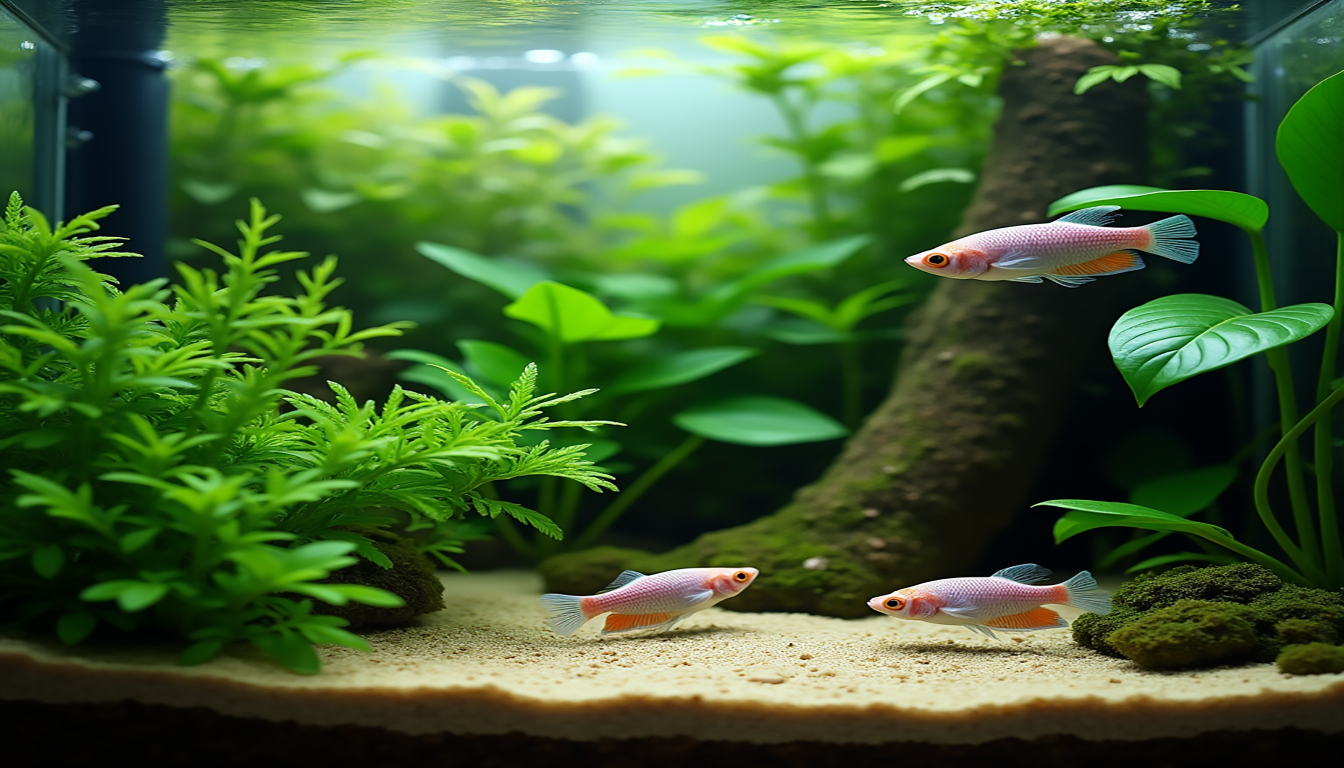
Ever wonder if betta fish sleep? These colorful fish have sleep patterns that might amaze you. Betta fish do sleep, but their way of resting is quite different from ours.
Betta fish sleep habits are unique. They are mostly active during the day. When they rest, they might look still or float in their tank.
It’s important to know how betta fish sleep to keep them healthy. They need 12 to 14 hours of rest each day. This includes 6 to 8 hours at night and short naps during the day.
Table of Contents
The Basics of Betta Fish Sleep Patterns
Learning about betta fish sleep is fascinating. These colorful fish sleep differently than most fish. They have unique sleep patterns that are important for their health.
Betta fish are active during the day and sleep at night. They take short naps throughout the day and night. Unlike many fish, betta fish like to rest in specific spots in their tank.
Natural Sleep Cycle in Bettas
The sleep cycle of betta fish is special and flexible. They often rest on:
- Broad plant leaves
- Aquarium substrate
- Decorative tank elements
Bettas sleep with their heads down and tails up. This is different from other fish.
How Sleep Differs from Other Fish Species
Betta fish sleep is very different from other fish. While many fish keep moving, bettas can stop completely. They use their labyrinth organ to breathe air from the surface while they sleep.
Duration of Sleep in Bettas
Betta fish sleep for short periods all day and night. Young bettas are more active, while older ones sleep more.
“Rest is essential for betta fish health, and understanding their unique sleep behavior helps create a better environment for these fascinating creatures.”
| Age Group | Sleep Characteristics |
|---|---|
| Young Bettas | More active, shorter rest periods |
| Adult Bettas | Longer, more frequent rest periods |
| Senior Bettas | Extended sleep duration |
Do Betta Fish Sleep?
Many people wonder if betta fish sleep. The answer might surprise you. Betta fish do sleep, but their sleep is different from ours. Their unique sleep habits are key to their health.
Betta fish sleep in short bursts at night. They stay alert for threats. Unlike us, they don’t close their eyes when they sleep. This makes their sleep hard to spot.
“Sleep is not about unconsciousness, but about strategic rest for betta fish survival.”
- Betta fish are diurnal animals, meaning they are active during the day and sleep at night
- They typically sleep for 8-12 hours per day
- Require at least 12 hours of complete darkness for optimal sleep
Research shows betta fish sleep in specific ways. They often rest near the tank bottom or between plants. This helps them hide from predators.
| Sleep Characteristic | Details |
|---|---|
| Average Sleep Duration | 8-12 hours daily |
| Preferred Sleep Location | Bottom of tank, between leaves |
| Sleep Indicators | Minimal movement, slowed breathing |
Environmental factors affect betta fish sleep. Good lighting, steady water temperature, and calm surroundings are crucial. By understanding their sleep needs, you can keep your betta healthy and lively.
Signs Your Betta Fish is Sleeping
Knowing when your betta fish sleeps is key to good care. Spotting these signs helps keep your fish happy and healthy.
Physical Changes During Sleep
Betta fish sleep in ways that might surprise you. They show clear signs of rest:
- Color becomes noticeably duller or faded
- Movement significantly decreases
- Positioning becomes extremely still
- Eyes remain open (due to lack of eyelids)
Common Sleeping Positions
Bettas sleep in unique spots. Common places include:
- Near the bottom of the tank
- Resting on broad-leafed plants
- Floating near the water surface
- Wedged between tank decorations
Breathing Patterns During Rest
Betta fish breathe slowly while sleeping. Their gills and mouth move less but keep going. You might see:
- Slower respiratory rate
- Minimal body movement
- Consistent but gentle gill motion
“Bettas are light sleepers, maintaining awareness even during rest periods.” – Aquarium Experts
A healthy betta needs 12-16 hours of darkness to sleep well. Watching for these signs keeps your betta fish happy and well-rested.
When and Where Do Bettas Sleep?
Betta fish have interesting sleep habits. They are most active during the day and rest at night. They take short naps throughout the day.

Bettas can sleep in different places in their tank. They pick spots where they feel safe. Some common places include:
- Nestled among aquarium plants
- Resting on tank ornaments
- Floating near the bottom of the tank
- Tucked into substrate corners
Setting up a good tank is key for betta sleep. They need 8 hours of sleep each night. They like quiet places with plants.
*Darkness is essential for your betta’s rest, with experts recommending a maximum ambient light level of 50 lux for undisturbed sleep.*
When making your aquarium, add soft plants and gentle decorations. These help your betta sleep well. A good tank setup is important for their health.
Creating the Perfect Sleep Environment
Creating the perfect sleep space is key for betta fish care. The tank setup greatly affects their health and sleep quality. Knowing what makes a great sleeping area helps your fish stay healthy and happy.
Ideal Tank Setup for Rest
For a cozy sleep spot, consider these important factors:
- Provide multiple hiding spots using live or silk plants
- Include smooth decorations that offer shelter
- Use soft substrate to create resting areas
- Ensure minimum tank size of 5 gallons for proper movement
Lighting Requirements
Lighting is crucial for your betta’s sleep cycle. They need a day-night rhythm to sleep well.
| Light Duration | Recommended Setting |
|---|---|
| Daily Light Exposure | 12-14 hours |
| Darkness Period | 10-12 hours |
| Maximum Light Intensity | 50 lux |
Temperature Considerations
The right water temperature is vital for your betta’s sleep. Consistent temperatures prevent stress and promote healthy rest.
Ideal water temperature range: 78°F to 82°F (26°C to 28°C)
By following these tips, you’ll make a sleep-friendly environment for your betta. This supports their health and long life.
Common Sleep-Related Concerns

It’s important to know about betta fish health and sleep. Your betta might face sleep issues that need your attention.
Some common sleep concerns for betta fish include:
- Excessive daytime sleeping
- Irregular sleep patterns
- Difficulty falling asleep
- Unusual resting positions
Betta fish need 8-10 hours of sleep each night. If your fish sleeps a lot during the day, it might have health problems. This could mean they’re not sleeping well at night or are stressed.
“A well-rested betta is a healthy betta” – Aquarium Experts
Things that affect betta fish sleep include:
| Sleep Factor | Recommended Range |
|---|---|
| Nighttime Darkness | 12-16 hours |
| Water Temperature | 78-82°F |
| Tank Size | Minimum 5 gallons |
For the best care, watch your betta’s sleep closely. If they sleep strangely, it could mean they’re stressed, sick, or have environmental problems. You should check these issues right away.
Impact of Tank Conditions on Sleep Quality
Creating the right environment is key for your betta fish’s health and sleep. The tank setup greatly affects how well your fish rests and recovers. Knowing what impacts sleep quality helps you create the best home for your fish.
Critical Water Parameters
Keeping water conditions just right is vital for your betta’s health and sleep. Research shows certain parameters are crucial:
- Water temperature should range between 76-81°F
- pH levels must stay between 6.5-7.5
- Ammonia levels must remain at zero ppm
- Nitrate levels should be under 40 ppm
- Nitrite levels must be zero ppm
Tank Size and Decoration Considerations
The size and decoration of your betta fish tank greatly affect sleep. Larger tanks offer more space for natural behavior and better rest. Studies show fish in tanks 5.6L or larger have healthier activity levels.
| Tank Size | Recommended For | Sleep Quality Impact |
|---|---|---|
| 2.5 gallons | Minimum survival | Poor sleep quality |
| 5 gallons | Ideal individual betta | Good sleep quality |
| 10 gallons | Multiple bettas | Excellent sleep environment |
Environmental Factors Affecting Sleep
External stimuli can greatly disrupt your betta’s sleep. Bright lights, constant noise, and vibrations can stop proper rest. Make sure to have a consistent light-dark cycle and reduce tank disturbances for better sleep.
“A well-designed tank is more than decoration—it’s a sanctuary for your betta’s health and rest.” – Aquarium Experts
Understanding Abnormal Sleep Behavior
Betta fish health and sleep patterns can tell you a lot about your pet’s well-being. Spotting abnormal sleep signs in betta fish is key to quick health issue fixes.
Abnormal sleep in bettas often points to hidden health problems. Here are some signs to look out for:
- Excessive daytime sleeping – This could mean nighttime issues
- Unusual rest positions that differ from typical sleeping patterns
- Significant changes in color vibrancy during sleep
- Irregular breathing rhythms
Potential causes of disrupted sleep include:
- Incorrect lighting cycles
- Inappropriate tank temperature
- Water parameter inconsistencies
- High stress levels
“A betta’s sleep is crucial to its overall health and should never be overlooked.” – Aquarium Experts
Your betta’s sleep environment is key to its health. Make sure it has a 12-16 hour dark cycle and stable water. Stress can mess with sleep, so keep your fish’s home calm and comfy.
If your betta sleeps abnormally for a long time, see an aquatic vet. Watching your betta’s sleep can help spot health issues early.
Conclusion
Knowing how much sleep your betta fish needs is key to their health. These amazing pets sleep for 8 to 12 hours a day. They do best with 14 hours of light and 10 hours of dark.
Creating the right sleep space is important. This can greatly improve your betta’s life.
Keeping the water right is also crucial. The tank should be between 76°F and 82°F, best at 78°F to 80°F. A stable environment is vital. A 5-gallon tank with good water quality helps a lot.
Watch how your betta sleeps. Too much sleep can mean they’re sick. Good care can make them live longer and healthier.
By caring for your betta’s sleep, you’ll have a lively pet. With the right care, your betta will live a long, happy life.
FAQ
Do betta fish actually sleep?
Yes, betta fish do sleep, but differently than humans. They take short rest periods where they stay still and move less. Since they don’t have eyelids, their sleep looks unique.
How can I tell if my betta fish is sleeping?
Look for signs like less movement and a relaxed position near the bottom or in hiding spots. They might appear still but their gills will move slightly. Their color might also seem a bit duller.
How long do betta fish sleep?
Betta fish sleep in short bursts all day and night. Their rest periods can last from a few minutes to hours. They don’t sleep continuously like humans, but take many brief naps when they feel safe.
Do betta fish need complete darkness to sleep?
While bettas don’t need total darkness, they do benefit from a regular day-night cycle. Aim for 8-12 hours of darkness to help regulate their sleep. Use a timer on your aquarium light to keep their environment consistent.
Where do betta fish prefer to sleep?
Bettas sleep in various spots, like near plant leaves, behind decorations, or on the substrate. They prefer places where they feel safe and can rest without being disturbed. Having multiple hiding spots in your tank will make your betta feel secure.
Can stress affect my betta fish’s sleep?
Yes, stress can really mess with a betta fish’s sleep. Things like bad tank conditions, aggressive tank mates, poor water quality, or too much disturbance can keep them from resting well. This can harm their health and well-being.
How can I create a better sleep environment for my betta fish?
For better sleep, ensure a consistent light cycle and stable water temperature (around 78-80°F). Provide lots of hiding spots, keep the tank quiet, and maintain excellent water quality. Use soft, dim lighting and create calm areas for your betta to rest safely.
Is it normal for my betta to sleep during the day?
Yes, betta fish can sleep both day and night. They don’t have a strict sleep schedule like humans. As long as your betta is active and healthy at other times, daytime napping is perfectly normal.

